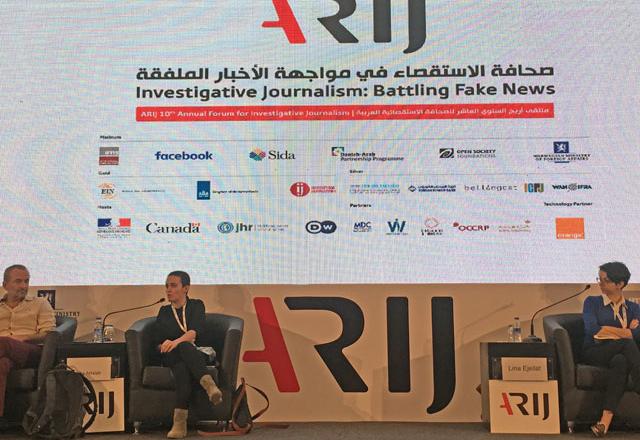You are here
Journalists meet at forum amid ‘setbacks across region’
By Rana Husseini - Dec 02,2018 - Last updated at Dec 02,2018
DEAD SEA — Over 450 regional and international media experts and trainers gathered at the lowest point on Earth on Friday to discuss the future of investigative reporting.
The media veterans and experts were taking part in the 11th Annual Forum for Arab Reporters for Investigative Journalism (ARIJ) which was held at the Dead Sea Convention Centre.
“I can proudly say that we have trained and supported 520 journalists who conducted investigative reports that made strong impacts and changes,” ARIJ’s Executive Director Rana Sabbagh said in her opening remarks to the forum.
This, Sabbagh added, was due to the "integrity and strong commitment of brave independent Arab journalists".
“Our programme is growing by the year. I remember the first year we held the forum, we had 100 participants. Today the number exceeds 400 even though we are living in a region where growing restrictions have stifled free speech and independent media like never before,” Sabbagh stressed.
Sabbagh expressed her appreciation for the participation of several reporters from the Gaza Strip “for the first time in five years”.
“I am also pleased to have Yemeni reporters, who risked their lives and went through tough routes in an isolated country, to be able to travel to Jordan and attend the forum,” Sabbagh said.
Sabbagh had asked the gathering for a moment of silence for those who had lost their lives unveiling the truth and “fighting corruption in Lebanon, Yemen, Syria and Iraq, among others”.
In her remarks, Sabbagh also thanked the Jordanian government for facilitating visas and travel permits for those participants coming from “restricted states and conflict zones”.
Executive Director of International Media Support Jesper Hojberg, who addressed the gathering during the official opening ceremony, said: “This [ARIJ forum] is indeed the place to be if you want to know what is happening in investigative journalism in the MENA region.”
“Since I spoke here at the conference last time in 2014, the Arab world has undergone significant changes. Turbulent developments and setbacks across the region, with the resurgence of authoritarianism, increased conflict and overall insecurity, the region's already challenging environment for investigative journalism has only deteriorated further,” Hojberg said.
“Hostility towards opposing points of view by state and non-state actors alike is omnipresent, almost without exception everywhere in the region and globally, posing significant challenges to investigate journalism — but certainly also underlining its importance,” Hojberg added.
Hojberg maintained that investigative journalism remains key in holding political actors to account, but perhaps its real value at the moment was its ability to mobilise and involve everyone in critical societal issues.
David Hivet, director of Middle East and Asia at the French Agency for Media Cooperation (CFI), also addressed the gathering, stating that “this forum is an opportunity to meet high-level media professionals from all over the region, working on a daily basis to support freedom of expression and pluralism”.
CFI, Hivet added, will hold its second workshop on “humanitarian journalism” for Yemeni journalists also attending the forum.
Earlier in the day, participants attended several workshops including one on “Documentary Production, Online Open Source Investigation and Best Practices for Sustainable Newsrooms”.
The participants are expected, during the three-day forum, to exchange tools of the trade and explore how digital innovation can advance accountability in the Arab world.
The forum will conclude on December 3, with a gala dinner, where winners in five categories of the ARIJ 2018 journalism competition will receive their awards.
This year’s forum was organised around the theme of “The Future of Investigative Reporting: Trends, Tools and Technologies”, according to a statement by ARIJ.
Some 60 international and Arab trainers will run 50 training sessions and workshops, largely dedicated to harnessing digital technology to create work that has an impact, the ARIJ statement said.
ARIJ has worked since 2006 to promote a culture of “accountability journalism” in a region where the powerful are not used to being held to account.
ARIJ sees technology, combined with deep reporting on issues of public concern by brave investigative journalists, as the way to bring about accountability, transparency and good governance.
Related Articles
AMMAN — Over 500 Arab and international investigative journalists will meet in Amman on Friday to discuss “the role of media in a radicalise
DEAD SEA — Over 475 participants from the Arab world gathered at the Dead Sea on Friday for the opening of the 10th Annual Forum for Arab Re
AMMAN — Over 500 media experts and specialists gathered in Amman over the weekend to tackle the challenges posed by the "wrong" use of socia












